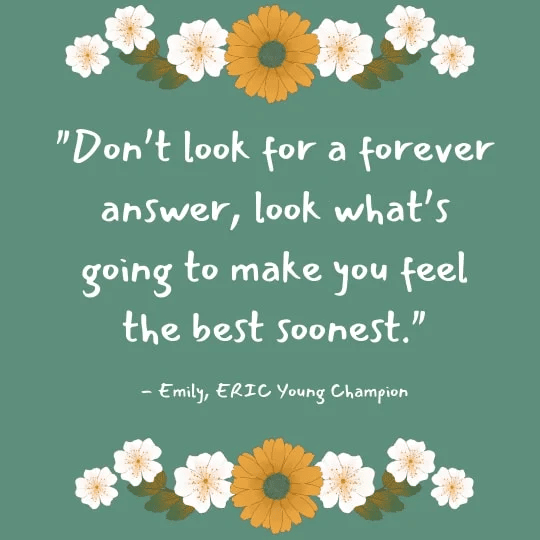Emily’s story: From medical mystery to diagnosis
ERIC Young Champion Emily talks about her interesting body and how it can take a long time to get the diagnoses you need.
My name is Emily, I’m 11 years old and I have been diagnosed with an overactive bladder and a neurogenic bowel which means I have chronic constipation and slow transit.
As of today I am diagnosed with an overactive bladder and a neurogenic bowel. The reason I say ‘as of today’ is because we are still learning about my conditions and I expect to have more diagnoses with time.
How it started

After a short illness and a stay in hospital when I was 9, I began to experience extreme stomach pain and nausea. I was very unwell and unable to attend school full time. A trip to A&E showed my bowel to be impacted which explained a lot of my symptoms. I was prescribed movicol and some suppositories and told to disimpact but this was only partially successful and I continued to feel very unwell.
A few weeks later, things got worse and I stopped being able to wee. I would not be able to wee for almost a whole day and again went to A&E lots during this time. Once a day, my bladder would be so heavy and full, I would have a massive accident. I felt miserable at this stage. I was frightened, embarrassed, in pain, confused. It was a very tough time.
Seeing a bladder and bowel specialist
After these new symptoms began I visited a specialist bladder and bowel paediatric clinic at a London hospital. They said that in order for me to feel better I had to learn to self catheterise. After a few visits to the hospital where they showed me how to do it I finally managed to do it myself. I was told I would need to do it every two hours or so to begin with.
A few months later (due to Covid-19) I had Urodymanic tests and more ultrasound scans where they diagnosed me with an overactive bladder. My bladder behaves unpredictably; sometimes it retains all my wee so I can’t pass urine naturally, sometimes it wets without giving me warning and sometimes it tells me it’s desperate to go but then doesn’t let me empty my bladder fully.
Bowel irrigation
Now, with all this going on, my bowel still didn’t sort itself out and after numerous disimpactions it became clear that I also had slow transit. I often felt sick, dizzy, off my food, moody and generally quite sad. We tried to kick start the bowel by taking Movicol to keep my poo soft and added stimulants like Senokot or Sodium Picosulphate to push it through quicker.
Unfortunately these didn’t work for me and by the time I was 10 I was back at the hospital where the nurses suggested that I should try bowel irrigation. I was again shown how to do this and have been using bowel irrigation ever since. My bowel is diagnosed as a neurogenic bowel which means I have chronic constipation and slow transit.
My feelings
When I was diagnosed with these things I had partly felt comfort since there was a definite answer but I didn’t feel happy with the treatment I had been given. I was frightened to use a catheter because it was so nerve wracking but I felt better about the bowel washout as I had used suppositories before. During the whole process I had felt sad, confused, alone, embarrassed and I was worried people were looking at me in a different way even though they knew nothing.
Current treatment
My current treatment plan is that I have two sachets of movicol a day and do bowel irrigation every evening by adding bisacodyl rectal solution to warm water that we flush up my bottom. In addition, I catheterise up to 7 times a day and have got used to catheterising in places other than at home. I’m not taking any medication for my bladder at the moment as previous medicines have given me side effects but I know this could all change when I next visit the hospital.
My top tips!
So based on my experiences so far, these are my top tips:
- Keep going with your treatments!
Even though the treatments seem strange the results completely outweigh how I felt before. If I told myself two years ago that I wouldn’t wet myself daily and that most days I am pain-free I would have been so shocked! - Don’t look for a forever answer, look what’s going to make you feel the best soonest.
Be prepared that the treatments can change.
Pay attention to your body and any changes that are happening and don’t ignore it - help yourself as soon as possible. - If you have bladder and bowel issues be prepared that they are linked very closely and problems with the bowel often mean you’ll see your bladder misbehaving too.
- Know that there are others out there the same as you. Our conditions are invisible and so it can be difficult to find other people but we do exist.
- For your parents: my mum joined a group called ‘Movicol Mummies’ on Facebook and joined the social network HealthUnlocked. She has also made use of the experts from the ERIC, The Children's Bowel and Bladder Charity.
About the authors:
The ERIC Young Champions are a group of young people aged 11-18 who have come together to raise awareness around bladder and bowel problems. They've shared videos and blogs about their conditions to help others.
Upcoming events
Share this page
